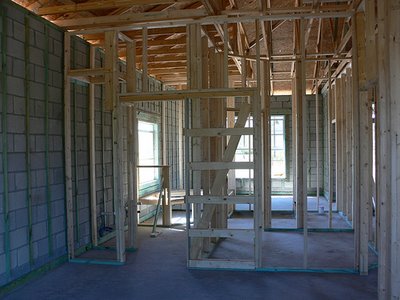Ottawa Housing Starts Drop in April
 Ottawa housing starts fell by a 13.3 % in April from one year earlier, a surprising signal of weakness in what has been a buoyant sector of the economy.
Ottawa housing starts fell by a 13.3 % in April from one year earlier, a surprising signal of weakness in what has been a buoyant sector of the economy.Residential construction starts dropped to an annualized rate of 218,100 last month, down from a revised figure of 251,700 reported in April.
The slowdown doesn't mean the party is over just yet for home builders and buyers who have been enjoying a red-hot market.
It likely won't deter the BoC from raising interest rates.
Western Canada is expected to remain a hotbed of residential construction activity, fuelled by an exploding resource economy, drawing a steady stream of workers, as well as relatively low mortgage rates.
Despite April's broad-based decline, there are good reasons to believe that the new housing market remains a pillar of strength.
The volatility often seen in multiple dwelling construction and the April statistics don't suggest significant weakening in the economy.
And that means the BoC could raise its key short-term interest rate at its next opportunity on May 24 to 4.25 %.
Declines in new home construction were noted in every region of the country in April.
But multiple family construction in urban areas was hit hardest, dropping by 22 %. Its lowest level since last August.
Construction starts on single-family homes also fell last month by 6 %, marking the third straight negative month.
Quebec saw a whopping drop of 24.7 % in multiple family dwellings while a 20 per cent decline was reported on the Prairies.
April's total of 96,500 multiple-unit starts was significantly less than the 123,000 reported in March 2006.
Multiple starts gave back all the gains registered last month.
In contrast to the volatility in multiple starts, the pace of single starts is slowing consistently as expected.
Multiple dwelling starts tend to be volatile, so the dramatic movements in April don't mean the housing sector is sinking.
With an unemployment rate of 6.4 % in April and interest rates relatively low, the housing market may cool but shouldn't crash in 2006.
We see evidence that the housing sector will continue moderating towards a soft landing amid a very solid employment picture and still-low borrowing costs, which will support the sector.
In Ottawa, total urban starts were down 12.2 % with single urban starts declining more than multiples.
The declines in the Atlantic region and British Columbia were relatively modest at 6.5 % and 2.3 % respectively.
Rural starts in April were estimated at an annual rate of 31,100.
In the first four months of 2006, actual urban starts were up 8.3 % when compared to the same period a year earlier.


1 Comments:
dGreat article! Mortgage. Find best mortgage rate and mortgage calculator.
Post a Comment
<< Home